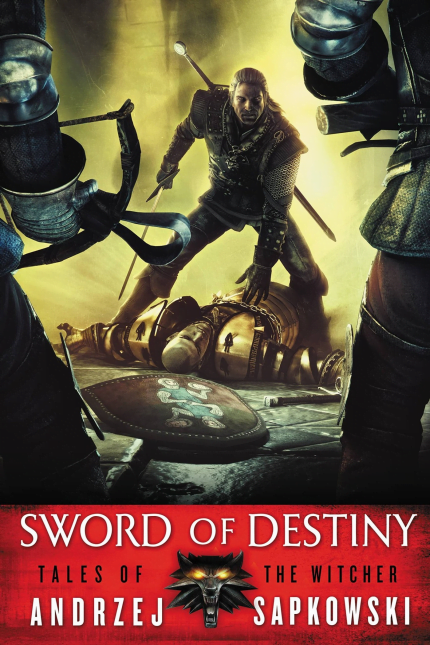Sword of Destiny (The Witcher, #0.75), by Andrzej Sapkowski,

Sword of Destiny by Andrzej Sapkowski
My rating: 5 of 5 stars
“‘Who the hell are you?’ Geralt asked again, leaning forward. ‘What are you doing… in this forest? How did you get here?’ The girl lowered her head and sniffed loudly. ‘Cat got your tongue? Who are you, I said? What’s your name?’ ‘Ciri,’ she said, sniffing.”
Once more we return to Geralt of Rivia, the eponymous Witcher, and his deeds. Mostly, though, “Sword of Destiny” serves to define Geralt with respect to his friends. We get to meet Dandelion again, and, of course, Geralt and Yennefer of Vengerberg cross paths several times as they are… Well, whatever they are, they certainly don’t know themselves.
Most importantly, though, Geralt meets Ciri, the Child of the Elder Blood, for the first time. Ciri, who will become so important in Geralt’s life. We meet her three times throughout the stories in this book which are loosely connected to each other but mostly show us who Geralt truly is.
The more I read, the more loose threads I dimly remembered from the entire saga actually turned out to be picked up and resolved. I liked this book the first time I read it but I only came to really appreciate its narrative depth and immersion this second time around. Whereas Geralt – to me at least – was a very likeable person, he really grew on me and I deeply sympathized with this fictious man.
Especially fascinating were his travels with Yurga, a travelling merchant he rescues, and on whom he invokes the Law of Surprise (for those (yet!) unenlightened among you: That means Geralt – as a reward – asks for something his debtor finds at home but didn’t expect, e. g. a child.). What is revealed as part of that voyage about Geralt is fairly astounding and deeply moving.
I was engrossed with the switches of perspective – Geralt alternatingly hallucinating and being clear-headed. When the borders between what he imagines and what’s real get murkier, the story becomes almost philosophical and we cannot ever be sure what was actually real and what was not. And, in fact, this is not being resolved. It’s up to the reader to decide for himself which makes me feel the author takes me seriously and I greatly appreciate that.
Ultimately, this is probably the best introduction any fantasy hero could hope for. What starts lightly and with witty sarcasm by “monsters”…
“‘That is right,’ the dragon interrupted. ‘Well, it’s the times we live in. For some time, creatures, which you usually call monsters, have been feeling more and more under threat from people. They can no longer cope by themselves. They need a Defender. Some kind of… witcher.’“
… goes to great length to end on a very serious and positive tone:
“‘It’s like they said! Geralt! It’s like they said! Am I your destiny? Say it! Am I your destiny?’
Yurga saw the Witcher’s eyes. And was very astonished. He heard his wife’s soft weeping, felt the trembling of her shoulders. He looked at the Witcher and waited, tensed, for his answer. He knew he would not understand it, but he waited for it. And heard it.
‘You’re more than that, Ciri. Much more.’”
Neither Geralt nor Ciri actually know at this point how right they are and, thus, I strongly encourage you, dear reader, to join them on their journey…
View all my reviews